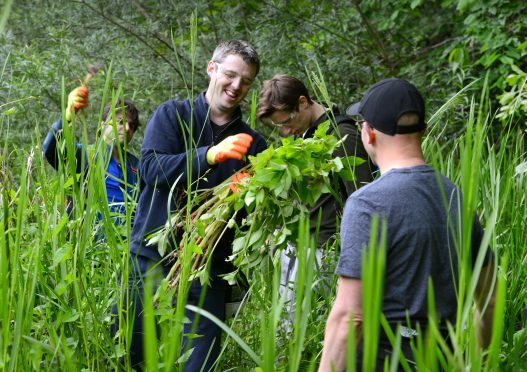Conservationists are fighting back against invasive plant species along the River Dee after their seeds were spread “far and wide” by a devastating storm three years ago.
In a new report, the River Dee Trust noted a significant increase in the amount of giant hogweed and Himalayan balsam throughout the region since Storm Frank in 2015.
The River Don Trust has also recorded a great deal of invasive vegetation.
The organisation believes the torrential flooding and high winds brought on during the disastrous winter storm, which destroyed roads and bridges and submerged Ballater’s high street, had a hand in dispersing the invaders.
Himalayan balsam was first introduced to the UK in 1839, and can cause significant problems for natural species as individual plants can grow up to 10ft in height, smoothing other vegetation.
Its seed pods open explosively when ripe, and each plant can produce up to 800 seeds.
And the sap of the giant hogweed, which can grow to more than 10ft in height, can cause a burning effect on skin.
A spokesman for the trust said: “Last year was a busy year for the River Dee Trust and the River Don Trust and their army of volunteers in the fight against invasive non-native plants on riverbanks.
“On the banks of the Dee, Himalayan balsam is the biggest invader – the swathes of bright pink flowers look cheerful enough, but they quickly get out of hand with flowers that explode seeds everywhere.
“Our survey at the start of the year identified over 40 hectares of this plant along the river bank.
“The amount of giant hogweed and Himalayan balsam on Deeside has increased compared to 2015, but this is due to the effect of Storm Frank, which spread their seeds far and wide.
“Giant hogweed has now overrun many of the riverbanks on Donside.”
Last year trained volunteers helped kill over 20 hectares of giant hogweed on the Don and the Urie with herbicide.
A north-east invasive non-native plants forum is now being set up to address problem animals and plants, such as giant hogweed, to help communities throughout Aberdeenshire to actively tackle these problem species in their areas.
The forum will meet on February 28 at the Kintore Arms Hotel, and anyone who would like further details should contact calum@riverdee.org
